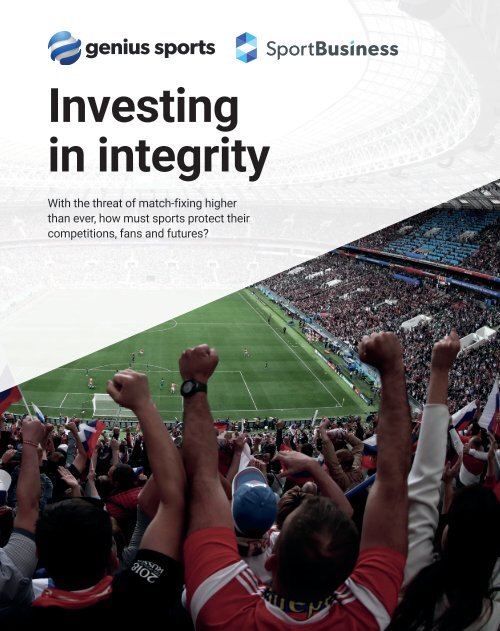Genius Sports Integrity Whitepaper
You also want an ePaper? Increase the reach of your titles
YUMPU automatically turns print PDFs into web optimized ePapers that Google loves.
Investing<br />
in integrity<br />
With the threat of match-fixing higher<br />
than ever, how must sports protect their<br />
competitions, fans and futures?
In association with GENIUS SPORTS<br />
What do sports need to truly combat<br />
the threat of match-fixing?<br />
Match-fixing poses the most significant threat to the integrity of modern sports. In combatting its threat,<br />
significant progress has been made of late. But what is the optimum model for protecting competitions and<br />
how can sports devise an integrity strategy that provides long-term protection and safeguards their future?<br />
While there is no definitive<br />
figure for how much<br />
the global sports sector<br />
is worth, we know that<br />
many billions are spent each year on<br />
tickets, TV rights and subscriptions,<br />
sponsorships, club membership,<br />
development of facilities and all other<br />
aspects of this complex and multifaceted<br />
industry.<br />
But while the experts may struggle to<br />
come up with a meaningful figure, one<br />
thing is certain. If the public was to lose<br />
its fascination for sporting competition,<br />
it’s value both commercially and to<br />
society would plummet.<br />
The world’s multi-billion dollar love<br />
affair with sport is based principally on<br />
the uncertainty of events. Sport is often<br />
described as the ultimate unscripted<br />
theatre, where we know the cast and<br />
setting, but where the ending is never<br />
certain. It’s the reason why sport is best<br />
watched live and continues to pull TV<br />
viewing figures which have advertisers<br />
drooling.<br />
But take away the uncertainty of<br />
outcome and what are you left with?<br />
Ultimately the answer is a big fat<br />
zero. Sport without fair competition<br />
and an uncertain result becomes<br />
meaningless and ultimately irrelevant.<br />
In short, sport faces an existential<br />
threat from those who want to rob it<br />
of its raison d’être by manipulating<br />
outcomes for their own ends. And it is a<br />
threat which has seldom been greater or<br />
more sinister. Fuelled by the huge sums<br />
to be made through illegal betting, the<br />
potential for athletes and officials to<br />
be coerced into match-fixing has never<br />
been greater.<br />
Experts in the field tell us that fixers<br />
look for and exploit vulnerability<br />
in those who can influence the<br />
outcome of a sporting event. And<br />
once the line has been crossed they<br />
are mired, possibly forever, in a world<br />
which may start with a single point<br />
deliberately lost in a tennis match or<br />
a no-ball bowled in cricket, but which<br />
ultimately leads to the dark, sinister<br />
and dangerous world of international<br />
organised crime.<br />
Match-fixing destroys trust and,<br />
consequently, reputation. A 2017 study<br />
by Portland Communications for their<br />
UK Sport <strong>Integrity</strong> index showed that<br />
match-fixing was the number one<br />
reason why fans would stop watching<br />
a particular sport, and this figure will<br />
only grow unless integrity issues are<br />
remedied.<br />
And with the loss of fans and a<br />
damaged reputation comes the impact<br />
on the balance sheet. Sponsors walk<br />
away, tickets remain unsold and media<br />
companies think twice about paying for<br />
(Marc Atkins /Getty Images)<br />
rights to damaged goods.<br />
This is not some imaginary<br />
doomsday threat; it is the real-life<br />
scenario which all sports face and is<br />
the reason why governing bodies need<br />
to take steps to develop strategies to<br />
protect their competitions from the<br />
prospect of manipulation.<br />
By drawing on the expertise of<br />
integrity specialists <strong>Genius</strong> <strong>Sports</strong>,<br />
this special supplement looks at the<br />
threats sports face and the steps<br />
which can be taken to protect their<br />
competitions. <strong>Genius</strong> <strong>Sports</strong> works<br />
with international sports governing<br />
bodies to protect their competitions,<br />
reputation and assets by adopting a<br />
process which starts with the building<br />
block of an integrity audit to assess risk<br />
before implementing and continually<br />
reviewing educational programmes,<br />
monitoring systems and other tools<br />
designed to keep the fixers at bay. Z<br />
Introduction by Kevin Roberts, founding<br />
editor of SportBusiness Review.<br />
2<br />
www.sportbusiness.com | TWITTER@SportBusiness
Identifying the issue<br />
The fight against match-fixing<br />
begins with identifying when<br />
and where it is happening.<br />
And over the past decade, bet<br />
monitoring technology has provided<br />
governing bodies with crucial insight into<br />
global betting on their competitions.<br />
These systems track and analyse<br />
millions of data points from sporting<br />
events around the world, scanning for<br />
significant odds changes across markets<br />
worldwide. This data can then be crossreferenced<br />
with predictive algorithms<br />
that indicate what the odds should look<br />
like at any given time. Together, these<br />
two data feeds create automatic alerts,<br />
highlighting potentially suspicious<br />
betting activity that requires further<br />
examination.<br />
To add context to the data, expert<br />
integrity analysts consider key<br />
intelligence, ranging from late team<br />
changes and injuries to weather<br />
conditions, with information pulled<br />
from a variety of different sources<br />
including individual bookmakers, social<br />
media and fan forums.<br />
When no legitimate explanation for<br />
the anomalous betting activity can be<br />
found, the governing body is alerted<br />
immediately, enabling them to crosscheck<br />
information and, if necessary,<br />
launch an investigation.<br />
Shining a light<br />
Bet monitoring technology - key components<br />
However, the value of bet monitoring<br />
technology is not limited to simply<br />
identifying incidents of match-fixing.<br />
A number of recent high-profile cases<br />
have demonstrated the increasing value<br />
monitoring reports have in driving<br />
effective investigations.<br />
This was particularly true during<br />
FIFA and the Court of Arbitration for<br />
Sport’s (CAS) recent case against referee<br />
Joseph Lamptey. Following a series of<br />
questionable decisions by Lamptey during<br />
Senegal’s 2-1 win over South Africa in<br />
November 2016, FIFA received dedicated<br />
reports from a number of monitoring<br />
companies including <strong>Genius</strong> <strong>Sports</strong>.<br />
FIFA’s Appeal Committee described the<br />
detailed betting analysis as a “strong<br />
strand of circumstantial evidence” that<br />
supported their decision to issue Lamptey<br />
with a lifetime ban.<br />
Bet monitoring information can be even<br />
more impactful in jurisdictions where<br />
there are specific laws against matchfixing<br />
as a criminal offence. The Southern<br />
Stars case of 2013, which led to a number<br />
of player arrests, was helped no end by the<br />
Victorian State legislation which enabled<br />
law enforcement authorities to quickly<br />
access key information such as phone<br />
records and email exchanges. Z<br />
In association with GENIUS SPORTS<br />
EXPERT INSIGHT: ADRIAN FORD, GENERAL MANAGER, FOOTBALL DATACO<br />
What is Football<br />
DataCo’s role in<br />
safeguarding the<br />
integrity of English<br />
and Scottish<br />
football?<br />
Football DataCo<br />
is the official data<br />
rights-holder of all<br />
the professional leagues in English<br />
and Scottish football. One of our<br />
key responsibilities is to support the<br />
Leagues in protecting the integrity<br />
of 14 different competitions, from<br />
the Premier League and Scottish<br />
Professional Football League to steps<br />
1-4 in the English National League,<br />
through providing specialist bet<br />
monitoring technology.<br />
What were the reasons behind<br />
your investment in bet monitoring<br />
technology back in 2014?<br />
The integrity and unpredictability<br />
of competitions has always been<br />
fundamental to both the English and<br />
Scottish Football Associations. With<br />
over 5,000 games a season, attracting<br />
betting from markets all over the<br />
world, we needed a system that shed<br />
light on global betting activity.<br />
We particularly wanted insight into<br />
the specific market movements and<br />
the individual factors that could trigger<br />
sudden or significant odds changes<br />
on our games. The more information<br />
Continued on the next page<br />
TWITTER@SportBusiness | www.sportbusiness.com<br />
3
In association with GENIUS SPORTS<br />
we have through monitoring reports,<br />
the more we understand the possible<br />
threat and the better we can<br />
equip ourselves to safeguard our<br />
competitions in the long-term.<br />
How has bet monitoring technology<br />
evolved over time?<br />
Since Football DataCo first began<br />
using bet monitoring technology,<br />
a major development has been the<br />
continued growth of in-play betting,<br />
which now accounts for up to 75 per<br />
cent of some online bookmakers’<br />
turnover.<br />
For sports, this trend has increased<br />
the need for monitoring technology<br />
that has highly accurate predictive<br />
models. These algorithms are<br />
derived from the technology that<br />
produces odds for bookmakers<br />
and take into account hundreds of<br />
different split-second factors such as<br />
injuries, sudden weather changes or<br />
substitutions.<br />
What does the recent overturn of<br />
PASPA mean for the integrity of<br />
US sports?<br />
Until the Supreme Court ruling in<br />
May, sports betting in the US had<br />
been prohibited outside of Nevada,<br />
leading to the establishment of a huge<br />
illegal betting market, estimated to<br />
be worth more than $150bn a year.<br />
So the integrity threat to US sports is<br />
already an issue from unlicensed or<br />
illegal bookmakers who often operate<br />
offshore. They don’t have the same<br />
obligations to report information<br />
or enforce Know Your Customer<br />
protocols and they often accept higher<br />
levels of betting on individual markets.<br />
Bringing sports betting into the<br />
open through regulation will provide<br />
greater visibility over betting activity<br />
and encourage cooperation between<br />
sports, betting and law enforcement<br />
and government. These are both key<br />
pillars to protecting the integrity of<br />
sports.<br />
Investing in education<br />
For any sport to have an effective<br />
integrity strategy, bet monitoring<br />
technology has to be at the heart<br />
of its approach. But prevention<br />
is better than cure and sports are also<br />
taking major steps to prevent the rot of<br />
match-fixing setting in at all.<br />
The answer lies in education. The<br />
vast majority of sportsmen or women<br />
who become embroiled in match-fixing<br />
scandals have little or no understanding<br />
of the strategies of criminals attempting<br />
to manipulate games or the risks they<br />
are taking.<br />
<strong>Sports</strong> must therefore take<br />
responsibility to educate stakeholders<br />
at all levels. This begins with showing<br />
their participants the typical approach<br />
of a match-fixer and how to spot them,<br />
and the type of information criminals<br />
may look for. It also involves reinforcing<br />
how to respond to these incidents,<br />
including specific reporting protocols,<br />
what constitutes inside information,<br />
and the possible consequences – both<br />
professional and personal.<br />
All levels of a sport<br />
Both in and out of sports, education has<br />
the invaluable ability to provoke longterm<br />
change. And to maximise its value,<br />
sports must put a great deal of emphasis<br />
on the lower levels of their competitions<br />
and on youth teams, where salaries<br />
are lower and their players are more<br />
accessible to the public and possibly<br />
criminal influences.<br />
Giving young players the tools and<br />
knowledge to understand match-fixing<br />
and then report or challenge attempts<br />
by other players, club owners or officials<br />
to manipulate games is paramount.<br />
The foundations of education<br />
begin with face-to-face workshops<br />
between integrity experts and players,<br />
referees, coaches or officials. In-person<br />
sessions (delivered above by <strong>Integrity</strong><br />
Operations Director Ben Paterson) have<br />
greater emotional impact, which can be<br />
particularly useful when demonstrating<br />
the potential consequences.<br />
Meanwhile, the advent of e-learning<br />
technology has provided a new tool in<br />
every sport’s armoury. Ahead of 2018,<br />
the PGA Tour launched a customised<br />
e-learning module that has been made<br />
compulsory for all players, caddies and<br />
officials across its 130 competitions<br />
each year.<br />
Moving with the times<br />
The importance of player education was<br />
clearly demonstrated earlier this year by<br />
the Independent Review of <strong>Integrity</strong> in<br />
Tennis.<br />
This review followed a number of<br />
allegations of potential match-fixing<br />
across world tennis by Buzzfeed and BBC<br />
Sport in January 2016. When publishing<br />
its interim findings in April 2018, the<br />
report recommended that the “TIU<br />
(Tennis <strong>Integrity</strong> Unit) will devote greater<br />
attention to education” going forward.<br />
It recommended expanding the TIU’s<br />
in-person training efforts and delivering<br />
more education to the most vulnerable<br />
participants (those below the top tier of<br />
tennis competition), the appointment of<br />
a dedicated Education Manager as well as<br />
specialist integrity educators.<br />
“Effective education can turn the<br />
tide from an atmosphere of acceptance<br />
and resignation (of match-fixing) to<br />
an atmosphere of active participation<br />
and resolution to deal with the problem<br />
faced,” 1 the report stated. Z<br />
1<br />
IRP 14 Recommendations<br />
4<br />
www.sportbusiness.com | TWITTER@SportBusiness
EXPERT INSIGHT: ANDY LEVINSON, SVP TOURNAMENT ADMINISTRATION, PGA TOUR<br />
What were the<br />
motivations/context<br />
behind the PGA<br />
Tour’s <strong>Integrity</strong><br />
Program?<br />
<strong>Integrity</strong> is<br />
fundamental to<br />
the game of golf.<br />
The PGA Tour<br />
<strong>Integrity</strong> Program was established to<br />
educate all those involved with PGA<br />
Tour competitions about the potential<br />
influence of betting-related corruption<br />
and to closely monitor all betting activity<br />
on our competitions.<br />
PGA Tour athletes deserve to know<br />
that they are competing on a level<br />
playing field, and our fans deserve to<br />
know that each competitor is giving his<br />
best effort at all times.<br />
Why did you see it as necessary to<br />
combine educational measures with the<br />
core bet monitoring service?<br />
While sports betting has increased<br />
in popularity in the US, many athletes<br />
on the PGA Tour have had little to no<br />
experience with it. Betting-related<br />
corruption can come in many forms,<br />
some overt and some seemingly<br />
innocuous. Therefore, it is imperative<br />
that all of our constituents are educated<br />
on the manners in which negative<br />
influences may present themselves.<br />
What were the benefits for the PGA<br />
Tour of deploying an e-learning module<br />
(instead of face-to-face workshops) and<br />
how do you oversee/administer its use?<br />
The PGA Tour operates six professional<br />
golf Tours that compete around<br />
the globe. Only a limited number of<br />
participants compete at any given<br />
tournament. The e-learning module<br />
gave us the ability to reach our athletes<br />
across all six Tours in an easily<br />
digestible, comprehensive manner.<br />
With the use of password protected<br />
access, we are able to track participation<br />
in the program, and we have had 100 per<br />
cent compliance to date.<br />
What have been the outcomes/benefits<br />
of your <strong>Integrity</strong> Program to date?<br />
The Program has validated what we<br />
believed in advance, which is that PGA<br />
Tour competition does not currently<br />
have an issue with betting-related<br />
corruption. That is not to say that our<br />
sport is not immune or that the Program<br />
is able to catch everything.<br />
However, the results to date have<br />
been positive. Furthermore, we have<br />
been able to develop a baseline<br />
understanding of the betting activity<br />
on our sport in legal, regulated markets<br />
around the world, and this will help us<br />
as sports betting expands in the US and<br />
the popularity of betting on PGA Tour<br />
competitions grows globally.<br />
Has the recent overturn of PASPA in<br />
the United States increased the need<br />
for sports to employ educational<br />
services as part of their integrity<br />
strategy?<br />
Yes, particularly because many<br />
American athletes have never been<br />
exposed to regulated sports betting<br />
or even considered the potential for<br />
betting-related corruption.<br />
In association with GENIUS SPORTS<br />
Taking a bottom-up approach<br />
Match-fixing can expose<br />
even the smallest<br />
weaknesses in a sport’s<br />
armoury. If a sport’s<br />
internal policies and procedures are<br />
not effectively set up and regularly<br />
reviewed, betting-related scandals<br />
can cause irreparable damage. And<br />
the consequences stretch far beyond<br />
reputational harm.<br />
In recent years, sponsors have shown<br />
an increased willingness to terminate<br />
lucrative sponsorship agreements when<br />
match-fixing incidents arise, depriving<br />
sports of a key source of income. In<br />
October 2013, PepsiCo terminated its<br />
title sponsorship of the Indian Premier<br />
League just two years into a five-year<br />
contract reportedly worth $71m (€59m)<br />
with the negative publicity following<br />
the 2013 spot-fixing scandal believed to<br />
be a crucial factor.<br />
When the stakes are so high,<br />
sports cannot afford complacency.<br />
And increasingly, governing bodies<br />
must look to the very foundations<br />
of their integrity strategy to ensure<br />
their competitions are as protected as<br />
possible.<br />
From the ground up<br />
<strong>Sports</strong> have to adopt a holistic approach<br />
to their integrity. Specialised integrity<br />
audits examine a governing body’s<br />
entire integrity strategy, from the<br />
rules and regulations to their internal<br />
processes and means for participants to<br />
report suspicious information.<br />
First, these audits enable sports to<br />
understand the level of threat they are<br />
facing through a comprehensive risk<br />
assessment. This begins by analysing<br />
the profile of betting on that sport<br />
covering the levels of wagering on<br />
individual competitions, the number<br />
of bookmakers offering odds and<br />
assessments on which markets may be<br />
more susceptible to integrity issues.<br />
Another key area analysed is the<br />
systems sports have in place for<br />
gathering information from players,<br />
officials and other stakeholders on<br />
suspicious games. Dedicated phone<br />
lines as well as mobile apps are being<br />
made increasingly available in order to<br />
ensure sports can be alerted as quickly<br />
as possible to any potential issues.<br />
The complete integrity audit also<br />
covers the adequacy of rules and<br />
regulations in place, the organisation’s<br />
internal processes, and the cooperation<br />
and partnerships they have with other<br />
key stakeholders in the fight against<br />
TWITTER@SportBusiness | www.sportbusiness.com<br />
5
In association with GENIUS SPORTS<br />
match-fixing.<br />
Designed to “maintain integrity<br />
and prevent and mitigate bettingrelated<br />
corruption”, the PGA<br />
Tour’s <strong>Integrity</strong> Program is one of<br />
the most comprehensive in world<br />
sport and crucially was a result of a<br />
thorough audit of its existing rules<br />
and regulations. It combines their<br />
customised e-learning module with<br />
round-the-clock bet monitoring<br />
protection and regular reviews of their<br />
internal structures and procedures.<br />
Ultimately, a sport’s competitions<br />
will only ever be as secure as their<br />
foundations, and the PGA has taken a<br />
leading role in protecting the future of<br />
golf by looking to the long-term. Z<br />
(Getty Images/Stuart Franklin)<br />
EXPERT INSIGHT: KEVIN CARPENTER, SPECIAL COUNSEL, GENIUS SPORTS<br />
How important is it<br />
for sports to take a<br />
holistic approach to<br />
integrity and what<br />
does this mean in<br />
relation to integrity<br />
audits?<br />
There is no one<br />
single measure<br />
sports can take that will eliminate the<br />
multi-faceted threats posed by matchfixing<br />
and competition manipulation.<br />
The only way to effectively combat<br />
these threats is by sports taking a broad<br />
holistic approach to their integrity.<br />
However, this has to be done<br />
in a systemic way, starting with a<br />
thorough integrity audit led by a full<br />
risk assessment. You cannot devise an<br />
effective strategy without knowing the<br />
scale and scope of the specific threat<br />
that a particular sport is facing.<br />
Why should sports ban betting on their<br />
competitions by all participants?<br />
First, it is vital that sports convey a<br />
perception of clean and transparent<br />
competition which is supported by<br />
appropriate prohibitions on betting by<br />
participants. Also, by betting on their<br />
own sport, players, referees or coaches<br />
can make themselves vulnerable to<br />
those looking to manipulate games or<br />
events.<br />
Different sports approach this issue<br />
in multiple different ways but the most<br />
important point is that leagues put<br />
a prohibition in place which can be<br />
actively monitored and enforced.<br />
Should sports grant those who report<br />
suspicious information anonymity?<br />
What are the potential drawbacks of<br />
doing so?<br />
Ideally, to encourage the reporting of<br />
information around integrity threats,<br />
there would be complete anonymity<br />
granted. However, very few sports are in<br />
a position to do this. For investigators,<br />
a fully anonymous reporting system<br />
makes it is almost impossible to<br />
check the accuracy of the information<br />
provided, meaning it has very limited<br />
value in disciplinary hearings.<br />
A good approach would be to<br />
guarantee anonymity to the reporting<br />
person only from the point that charges<br />
are brought against a participant and<br />
then formal evidence required, up to and<br />
including the hearing. Such an approach<br />
has already been accepted by the Court<br />
of Arbitration for Sport in the FK Pobeda<br />
case.<br />
Are measures like integrity audits only<br />
available for leagues and federations at<br />
the top of sport?<br />
Certainly not. Match-fixing is a threat<br />
to all levels of sport and integrity<br />
audits are a vital tool for leagues and<br />
federations of all sizes. There are ways<br />
and means in which an integrity audit<br />
can be done at a minimal cost and at<br />
<strong>Genius</strong> <strong>Sports</strong>, we have developed an<br />
integrity pack which can be tailored to<br />
a sport of any size to implement good<br />
practices drawn from many sources.<br />
Does the recent overturn of PASPA<br />
in the United States increase the<br />
need for US sports to invest in key<br />
measures such as integrity audits?<br />
Six years ago at a conference in San<br />
Diego, I stated that sports betting<br />
would become legal within the United<br />
States within a decade. At the time,<br />
this was greeted with significant<br />
derision but now that PASPA has been<br />
repealed and with the levels of betting<br />
set to increase, it is more important<br />
than ever that the major leagues’<br />
integrity strategies are robust, multifaceted<br />
and built for the long-term.<br />
<strong>Integrity</strong> audits can enable US<br />
sports, many of whom are already<br />
utilising bet monitoring technology, to<br />
address and enhance each component<br />
of their integrity strategy, projecting<br />
a positive public image to fans and<br />
demonstrating a clear commitment<br />
to protecting the integrity of their<br />
competitions.<br />
6<br />
www.sportbusiness.com | TWITTER@SportBusiness
Cooperation is key<br />
Corruption can only be<br />
defeated by concerted and<br />
coordinated cooperation.<br />
Open communication between<br />
sports, betting operators, regulators, law<br />
enforcement, governments and integrity<br />
specialists is vital.<br />
<strong>Sports</strong> assume the main responsibility<br />
for protecting the integrity of their<br />
competitions and governing bodies<br />
should share their experiences and<br />
strategies with one another. This<br />
enables best practices to be developed<br />
and new innovations in integrity to be<br />
more widely adopted.<br />
LaLiga has led the way for<br />
cooperation in football, working closely<br />
with other leagues and federations<br />
across South America to present<br />
and discuss its own robust integrity<br />
programme.<br />
At a time when international<br />
player transfers are commonplace,<br />
global cooperation is vital for sharing<br />
intelligence and identifying players or<br />
officials who have a history of being<br />
involved in suspicious games.<br />
bookmakers such as William Hill with<br />
24/7 bet monitoring technology and<br />
close working relationships with law<br />
enforcement and the <strong>Sports</strong> Betting<br />
Intelligence Unit (SBIU).<br />
This commitment to cooperation is<br />
key to protecting all levels of English<br />
football and paid dividends in their<br />
recent six-year ban of professional<br />
player Bradley Wood (below, left)<br />
for 25 breaches of their <strong>Integrity</strong> and<br />
Betting Rules.<br />
Going global<br />
Match-fixing poses a truly global<br />
threat. More than ever, the bets that<br />
profit from manipulated games are<br />
largely being placed through an agency<br />
system with bookmakers operating<br />
in different jurisdictions to both the<br />
criminals behind the fix and where the<br />
actual sport is being played.<br />
Although attempts to stamp<br />
out match-fixing are increasingly<br />
complicated by the multiple<br />
jurisdictions involved, initiatives<br />
such as the Council of Europe’s<br />
Convention on the Manipulation of<br />
<strong>Sports</strong> Competitions (the Macolin<br />
Convention) can be extremely<br />
valuable to sports.<br />
As the only global legal framework<br />
for combatting match-fixing,<br />
supporting the Council of Europe’s<br />
efforts enables sports to demonstrate<br />
their existing integrity measures, work<br />
alongside government bodies to push<br />
for specific integrity legislation and<br />
liaise with law enforcement authorities<br />
to launch effective investigations. Z<br />
In association with GENIUS SPORTS<br />
Engaging with betting<br />
The consequences of match-fixing<br />
scandals are undoubtedly severe<br />
for sports. But they can be just as<br />
significant for bookmakers. The<br />
betting industry cannot survive<br />
without clean and transparent sport<br />
and bookmakers can face huge<br />
financial losses from corruption.<br />
Licensed bookmakers are a valuable<br />
partner to sports and their integrity<br />
strategies. Although not enough<br />
on their own, information sharing<br />
agreements can complement a sport’s<br />
bet monitoring capabilities, alerting<br />
them to individual account activity<br />
that may be suspicious, such as<br />
multiple new accounts being opened<br />
to avoid betting limits or significant<br />
sums being placed on smaller markets.<br />
The Football Association combines<br />
information sharing agreements with<br />
(Clive Brunskill /Getty Images)<br />
TWITTER@SportBusiness | www.sportbusiness.com<br />
7
In association with GENIUS SPORTS<br />
Proactive action holds the key<br />
Our love of sport relies almost<br />
entirely on one factor: its<br />
integrity. Sport’s global<br />
appeal and unique position in<br />
society hinges on the unpredictability of<br />
competitions.<br />
Fans have to believe that what they<br />
are watching is fair; unpredictable not<br />
preordained, exciting and not a cynical<br />
betrayal of sport’s values. But with<br />
match-fixing and doping seemingly more<br />
rife than ever, public confidence in the<br />
integrity of sport is at an all-time low.<br />
Doping clearly undermines the<br />
founding principles of any sport.<br />
But where it is often instigated by<br />
the athlete or his inner circle in<br />
order to win, match-fixing can see<br />
players purposefully losing games in<br />
order for others to make significant<br />
financial gain. And where doping<br />
is ordinarily a violation of a sport’s<br />
rules, match-fixing is often run by<br />
international crime organisations<br />
looking to corrupt sport to circumvent<br />
laws and financially exploit a sport’s<br />
vulnerabilities.<br />
“Match-fixing is the single greatest<br />
threat to the integrity of sport,<br />
infiltrating all levels of competition<br />
on a global scale” says Ben Paterson,<br />
<strong>Integrity</strong> Operations Director at <strong>Genius</strong><br />
<strong>Sports</strong>. “When addressing this threat,<br />
all sports have two clear options. They<br />
can bury their head and pretend their<br />
competitions aren’t at risk, or they<br />
can assume a multi-pronged<br />
approach that combats<br />
integrity issues in the<br />
long-term and helps to<br />
ensure their future.”<br />
The reality is that<br />
sporting integrity is at<br />
a crossroads. While<br />
progress has been<br />
made and there are<br />
a growing number<br />
of solutions now<br />
at sports’ disposal,<br />
further action is<br />
undoubtedly required.<br />
Mere allegations of match-fixing<br />
can have disastrous consequences so<br />
perception is as equally important as<br />
reality. Public scrutiny on the integrity<br />
of sport will intensify until clear proof<br />
is provided showing that its leaders<br />
are giving integrity the importance<br />
it deserves.<br />
<strong>Sports</strong> are not alone in the fight<br />
against match-fixing. But they must<br />
have a proactive vision towards the<br />
long-term that puts integrity at<br />
the top of their agenda. Z<br />
ABOUT GENIUS SPORTS<br />
<strong>Genius</strong> <strong>Sports</strong> is global leader in<br />
sports data, technology and integrity<br />
services. It leads the global fight<br />
against match-fixing and bettingrelated<br />
corruption through cuttingedge<br />
bet monitoring technology,<br />
education (face-to-face workshops<br />
and e-learning modules), integrity<br />
audits and investigatory services.<br />
<strong>Genius</strong> <strong>Sports</strong> is the trusted<br />
integrity partner to some of the<br />
largest organisations in world sport<br />
including Major League Baseball, the<br />
PGA Tour, Football DataCo and the<br />
English Premier League.<br />
Find out more from<br />
<strong>Genius</strong> <strong>Sports</strong>:<br />
contactus@geniussports.com<br />
www.geniussports.com/sports<br />
8<br />
www.sportbusiness.com | TWITTER@SportBusiness<br />
(Elsa/<br />
Getty Images)















